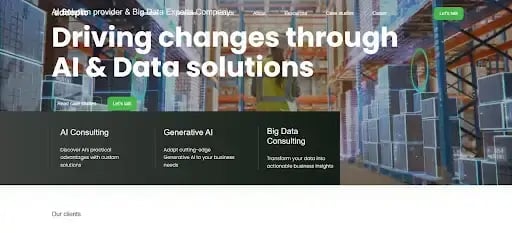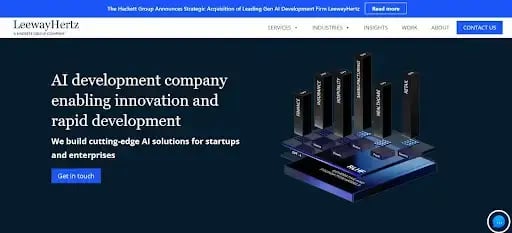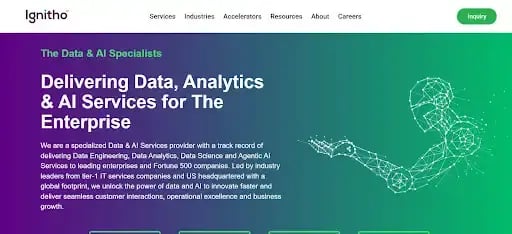Top 10 Generative AI eCommerce Development Companies Leading in Retail Innovation
August 25, 2025

AI is moving fast, but that doesn’t mean you need to rush every decision. If you’re leading digital or eCommerce at a retail brand, you’re likely exploring how artificial intelligence fits into your strategy. You’ve seen the rise of AI chatbots, smarter shopping journeys, and platforms promising better customer engagement.
But finding a development partner who understands commerce means more than delivering good tech. You need someone who works within your roadmap, fits into your systems, and moves in step with your team.
That’s why this article gives you a focused comparison of the top players in Generative AI eCommerce development. First, let’s get clear on what these services actually include, and what they don’t.
What Are Generative AI eCommerce Development Services?
Generative AI eCommerce development services help you bring AI into your commerce stack, where it creates direct value. That includes automating content creation, building personalized experiences, powering AI search, generating product descriptions, and developing tools such as chatbots or virtual assistants that plug into your systems.
These services let you apply models, such as large language models, across platforms, whether you’re running on Shopify, Salesforce, or a headless setup.
And gen AI works incredibly well, which is what triggers its high adoption rate. According to NVIDIA’s 2025 State of AI in Retail and CPG report, over 80% of retail and CPG companies are already piloting or using generative AI.
Here’s more info on how generative AI is transforming eCommerce:
Next, let’s go over what’s actually driving this shift and why it matters now.
Why Do You Need Generative AI eCommerce Development Services?
You’re under pressure to move faster, cut costs, and raise the bar on personalization. That’s where generative AI gives you a real advantage. When used well, it helps you automate workflows without losing control over customer-facing outputs.
Here’s what these gen AI ecommerce development services can help you with:
- Cut launch times by automating content development and merchandising flows across teams.
- Raise conversion rates by personalizing the customer journey. McKinsey’s data shows that retailers implementing personalization typically increase revenue by 10-15%, with top performers seeing up to 25% growth.
- Cut costs on customer support and content workflows with GenAI integrations.
- Support scale by integrating AI across your commerce platforms, whether you’re using headless builds, Salesforce Commerce, or custom APIs.
- Use AI chat and virtual shopping assistants to improve customer experience and help move users through the funnel faster. Rep AI’s 2025 AI Ecommerce Shopper Behavior Report shows a 47% faster checkout rate when AI is involved.
- Keep brand voice and messaging consistent across AI-generated outputs by using prompt controls, approval workflows, and fine-tuned large language models.
Now that you’ve seen the value, the next step is evaluating who can actually build and deliver these systems. Let’s compare the top development partners in this space.
Further reading: Building with generative AI is easier when it’s part of a larger transformation plan. If you’re also rethinking your strategies, learn how to increase your eCommerce transaction reliability, too.
Top Generative AI eCommerce Development Companies
Picking the right partner directly affects how fast you move, how well you scale, and how much control you keep. Here are the firms that deliver proven results in AI-driven retail and marketing content execution.
1. Nova Cloud

We specialize in generative AI solutions purpose-built for commerce. Our approach combines large language model (LLM) engineering with hands-on experience across retail, D2C, and marketplace platforms.
What sets us apart is how closely we align our work with your merchandising, product discovery, and content operations, not just your tech stack. From AI-driven search copilots to automated SEO and catalog enrichment, we build tools that actually move the needle.
Nova Cloud integrates with the systems you already rely on. That means Salesforce, Shopify, BigCommerce, or your headless stack. You get API-first modules and middleware that drop straight into your current setup without slowing you down.
We also help your teams stay in control, with guardrails for brand safety and human-in-the-loop options when needed. Whether you need faster content production, smarter merchandising, or AI-native customer journeys, our team builds around your goals.
Key features:
- Personalized discovery tools such as AI chatbots and search copilots.
- Automated content for product descriptions, SEO, and creative assets.
- Real-time A/B testing for merchandising copy, images, and CTAs.
- Voice assistants and chat integrations for conversational commerce.
- Middleware and API integrations for scalable AI adoption.
Pros:
- Deep commerce domain focus.
- Fast time-to-market with prebuilt GenAI modules.
- Flexible integrations across all major platforms.
- AI built with brand safety in mind.
Cons:
- Requires some collaboration early on to align AI with your workflows.
Website: novacloud.io
Pricing: Custom quote.
2. RebelDot

RebelDot is an AI development and consulting firm known for building customized AI and web solutions for retail and D2C clients. Its work spans across product discovery tools, chatbot interfaces, and AI-based content systems built for specific commerce needs.
The team focuses on aligning each project with your business goals. The company supports everything from early AI use-case validation to building and launching full-stack solutions across web and mobile platforms.
Key features:
- End-to-end AI strategy and system build.
- Custom dataset modeling and software tailored per client.
- Integration with web, mobile, and AI tooling.
- Focus on experience design alongside technical build.
Pros:
- Flexible, client-driven methodology.
- Technical skillset across modern stack.
- Execution discipline and delivery focus.
Cons:
- Commerce-specific insights may be less sharp.
- May require onboarding to align with retail standards.
Website: rebeldot.com
Pricing: Custom quote.
3. Addepto

Addepto specializes in AI consulting and generative implementations for commerce, with a strong focus on personalization and automation. It helps you leverage customer data and transaction insights to build practical recommendation engines and dynamic pricing tools.
The company also brings RPA and predictive analytics into operations and marketing workflows, though its approach may feel more data analytics-led than merchant-first. For teams that need heavy data modeling and predictive use cases, this firm offers extensive support.
Key features:
- AI strategy and use-case validation.
- Personalization models and recommendation engines.
- Automation of inventory, supply chain, and marketing workflows.
- End-to-end development with monitoring and fine-tuning support.
Pros:
- Analytics and ML expertise.
- Delivery of data-driven personalization.
- Support for operational automation.
Cons:
- Retail-specific commerce nuance may require adaptation.
- May lean data-first over merchandising-first.
- Time zone gaps if your team is outside Europe.
Website: addepto.com
Pricing: Custom quote.
4. LeewayHertz

LeewayHertz is an AI development firm with strong capabilities in generative AI, mobile apps, and blockchain. You get full-spectrum support, from strategy and model building to deployment and support.
For e-commerce brands, it builds solutions such as chatbots, recommendation systems, predictive analytics tools, and even voice-based ordering. Beyond commerce, it scales advanced LLM deployments (GPT‑4 and more) for enterprise-grade reliability and predictive analytics.
Key features:
- Strategy, consulting, and generative AI development.
- Retail-focused applications such as product discovery and virtual try-on.
- Custom foundation models fine-tuned to your data.
- Support across AI, mobile, and blockchain stacks.
Pros:
- AI and software development background.
- Enterprise-grade and scalable solutions.
- Cross-domain tech expertise.
Cons:
- Slight potential for timeline delays on complex projects.
- Process transparency may vary early in engagement.
Website: leewayhertz.com
Pricing: Custom quote.
5. SoluLab

SoluLab blends AI, blockchain, mobile, and web development skills to build scalable commerce tools. You get generative AI consulting, custom app development, integration, and ongoing support tailored to eCommerce needs.
The firm is especially strong at combining AI recommendation engines with workflow automation and virtual assistants. What sets SoluLab apart is its ability to deliver cross-technology solutions that scale as your business grows, making it a fit for ambitious digital commerce teams.
Key features:
- AI consulting through development and maintenance.
- Automation of tasks from the catalog to marketing workflows.
- Virtual assistant and conversational commerce tools.
- Cloud-native architectures designed to scale.
Pros:
- Technical skill set across emerging technologies.
- Delivery and scalable architecture.
- Clear project communication and collaboration.
Cons:
- Initial design phases may require tighter feedback loops.
- More focus on innovation tech than core commerce nuance.
Website: solulab.com
Pricing: Custom quote.
Pro tip: Generative AI can create amazing customer experiences but only if they perform. Monitoring those experiences is just as important as building them.
6. Kanerika

Kanerika is a data consulting and generative AI partner with deep strength in building intelligent pipelines and AI-driven retail operations tools. You’ll get help shaping data governance, clean integration between CRM, PIM, analytics, and AI-ready systems.
And its focus on combining predictive analytics with automation means you’ll be able to run demand forecasting, inventory optimization, and personalized outreach with a clean, trusted data flow. This means you’ll run more efficient operations and have a tighter alignment between data and commerce outcomes.
Key features:
- Unified data pipelines and ETL for enterprise retail systems.
- AI models for demand forecasting and supply chain planning.
- Personalized recommendations and segmentation engines.
- RPA-based automation for back-office retail tasks.
- Governance framework for data quality and compliance.
Pros:
- Data engineering base and AI pipeline discipline.
- Demand-forecasting and targeting systems.
- Automation-ready tools for reducing manual work.
Cons:
- Platform integrations may need extra alignment with your tech stack.
- Initial user onboarding may include a small learning curve.
- Customer-facing interfaces feel more data-first than retail-first.
Website: kanerika.com
Pricing: Free subscription and paid plans starting at $1699-$2852/month.
7. BotPenguin

BotPenguin focuses on conversational commerce through chatbots and AI-powered virtual shopping assistants. The platform allows businesses to deploy customer-facing bots across websites, chat apps, and social channels without coding.
These assistants guide users through product discovery, ordering, and support while supporting NLP and multilingual conversations.
What makes BotPenguin stand out is its accessibility. Lean teams can launch AI shopping flows quickly without heavy development, so you get a cost-effective way to boost customer engagement.
Key features:
- Chat-first interface for selling and servicing in one flow.
- Multilingual chatbots with voice/text interaction.
- No-code builder for basic AI chatbot deployment.
- ChatGPT-like assistants for quick replies.
- Plug-and-play support for social and messaging platforms.
Pros:
- Easy to launch and manage for non-technical teams.
- Low-cost plans that suit simple setups.
- Works across multiple messaging channels.
Cons:
- Not designed for advanced eCommerce logic.
- Platform flexibility is limited for complex workflows.
- Some performance issues with third-party integrations.
Website: botpenguin.com
Pricing: Free plan available with paid plans starting at $15/month.
8. Markovate

Markovate is a generative AI development and consulting firm focused on personalization, catalog enrichment, and customer engagement tools. Its team builds custom AI agents to help you automate content generation and deliver relevant product recommendations at scale.
Many retailers use Markovate to improve catalog data, such as auto-generating product descriptions or tags, and to implement AI-powered chatbots. The company also provides AI integration support and guidance to help you align these tools with your core systems.
Key features:
- Automates the generation of product descriptions and marketing content.
- Enhances search through metadata, tags, and visual content.
- Offers real-time suggestions based on browsing and purchase data.
- Delivers personalized support tied to your product catalog.
- Aligns tools with workflows for better outcomes.
Pros:
- Clear outcomes from AI adoption.
- Integrating AI into retail flows.
- Works across use cases, from chat to content.
Cons:
- Limited support after delivery.
- May need better onboarding and training.
- Requires a minimum project size.
Website: markovate.com
Pricing: Custom quote.
9. Ignitho

Ignitho helps retail and eCommerce brands apply AI to automate operations and create personalized user experiences. Its strength lies in tying AI to your existing enterprise systems.
The company uses machine learning and automation to improve efficiency in supply chains, customer service, and product workflows. You can also work with their team to add personalization features, such as smarter loyalty campaigns or product recommendations.
Key features:
- Works with existing CRM, ERP, and customer databases.
- Streamlines repetitive tasks such as ticketing or fulfillment.
- Applies predictive models to demand forecasting and trend tracking.
- Builds custom retail AI applications.
- Provides secure and scalable delivery.
Pros:
- Efficient engineering processes.
- Reliable at scale.
- Flexible delivery model.
Cons:
- Global coordination adds complexity.
- Support costs may add up.
- Staff transitions may occur mid-project.
Website: ignitho.com
Pricing: Custom quote.
10. Codiste

Codiste is a firm that combines generative AI and blockchain expertise to build retail solutions focused on automation and smart personalization. Here’s what that means.
First, if you need chat-based assistants, custom recommendation engines, or AI-generated ad creatives and product descriptions, this company can deliver. Secondly, the team also applies blockchain for secure transactions and supply chain transparency.
Codiste is experienced in using LLMs and deep learning to power these types of intelligent tools. And they’ll be able to support your business goals, too, from enhanced customer satisfaction to streamlined decision-making.
Key features:
- AI‑powered chatbots for support and sales.
- Content generation for product descriptions, ads, and social channels.
- Recommendation engines that analyze customer behavior and suggest products.
- Blockchain-enabled data integrity tools for secure provenance.
Pros:
- Fast onboarding for smaller teams.
- Focused technical delivery geared toward measurable outcomes.
- Combines AI with blockchain for niche retail use cases.
Cons:
- Limited history with large enterprise projects.
- May need additional support if you’re scaling fast.
Website: codiste.com
Pricing: Custom quote.
How to Choose Generative AI eCommerce Development Companies
Choosing the right GenAI partner impacts how quickly and effectively you deliver value. The stakes are high, especially when your AI investment ties directly to sales, operations, and long-term loyalty.
Here are the core areas you should review before making a decision:
- Confirm they’ve built AI specifically for commerce. This means use cases such as personalized product suggestions, catalog generation, or predictive pricing.
- Look for integration strength across your platforms, such as Shopify, BigCommerce, Salesforce, or headless front ends. Ask how they support full omnichannel execution.
- Ask how they align AI outputs with your brand voice and compliance policies.
- Dig into their approach to LLM safety. That includes filters to stop inappropriate output and techniques to reduce hallucination and bias.
- Ask how they automate model testing, performance monitoring, and tuning after launch to keep results reliable over time.
- Review their delivery model. Ask how closely their teams will work with yours, especially across time zones or sprint cadences.
The truth is, great AI execution starts with the right partner (one that already knows how commerce works).
Pro tip: Running Salesforce Commerce Cloud? Then your generative AI tools need to plug in smoothly. We put together the best teams for integration help when AI alone isn’t enough.
Ready to Turn AI into Revenue?
Generative AI has moved beyond testing and now drives real results across product discovery, content creation, and merchandising. As you explore vendors, prioritize those who understand the cost and performance pressures you’re balancing every day. Look for expertise in AI personalization tools, product reviews, and predictive customer behavior to stay ahead of fast-moving market trends.
Nova Cloud leads in delivering retail-specific AI solutions that fit your stack, respect your brand, and show results. If you’re serious about operational gains and better experiences, start with Nova’s Generative AI eCommerce Solutions.
FAQs
How can generative AI improve eCommerce personalization and conversion rates?
It allows you to deliver personalized marketing at scale. You can serve dynamic product recommendations, personalize on-site search, or create email marketing campaigns based on real-time behavior. This leads to higher click-through rates and more conversions.
What’s the difference between generative AI and traditional AI in eCommerce?
Traditional AI focuses on analysis, like predicting customer preferences or optimizing inventory management. Generative AI creates new content, including product images, descriptions, and ad creatives, that are tailored to specific audiences using models such as DALL·E 2 and transformer models.
How do I ensure generative AI content stays on-brand and compliant?
Use output control tools, pre-set brand tone parameters, and human review workflows. These keep content accurate and aligned with legal or brand guidelines, whether on product display pages, ads, or customer communications.
Can generative AI help reduce content production costs for large catalogs?
Yes, especially with automated tools for visual product customization and bulk description generation. This reduces manual effort while maintaining quality.
What platforms can generative AI eCommerce solutions integrate with?
Solutions can integrate with Shopify, Salesforce, BigCommerce, and headless stacks. Support for cloud integration services and custom APIs allows wider compatibility across your tech ecosystem.
Comments